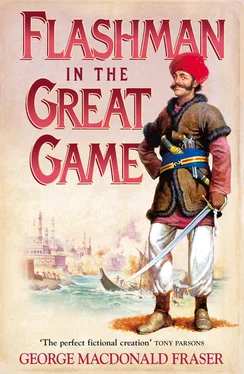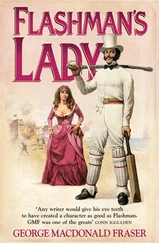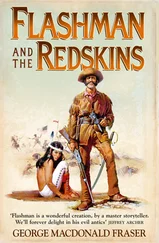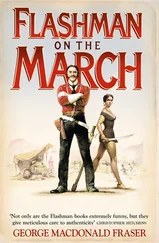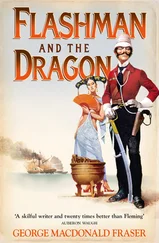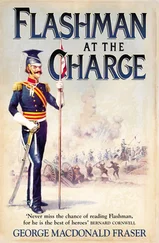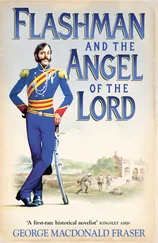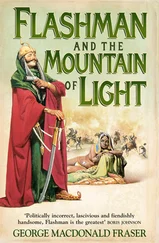Hullo, says you, what’s this? – not Flashy taking his duty seriously for once, surely. Well, I was, and for a good reason. I didn’t take Pam’s forebodings seriously, but I knew I was bound to go to Jhansi and make some sort of showing in the task he’d given me – the thing was to do it quickly. If I could have a couple of official chats with this Rani woman, look into the business of the sepoys’ cakes, and conclude that Skene, the Jhansi political, was a nervous old woman, I could fire off a report to Calcutta and withdraw gracefully. What I must not do was linger – because if there was any bottom to Pam’s anxieties, Jhansi might be full of Ignatieff and his jackals before long, and I wanted to be well away before that happened.
So I didn’t linger in Bombay. On the third day I took the road north-east towards Jhansi, travelling in good style by bullock-hackery, which is just a great wooden room on wheels, in which you have your bed and eat your meals, and your groom and cook and bearer squat on the roof. They’ve gone out now, of course, with the railway, but they were a nice leisurely way of travelling, and I stopped off at messes along the road, and kept my ears open. None of the talk chimed with what I’d heard at Balmoral, and the general feeling was that the country had never been so quiet. Which was heartening, even if it was what you’d expect, down-country.
I purposely kept clear of any politicals, because I wanted to form my own judgements without getting any uncomfortable news that I didn’t want to hear. However, up towards Mhow, who should I run into but Johnny Nicholson, whom I hadn’t seen since Afghanistan, fifteen years before, trotting along on a Persian pony and dressed like a Baluchi robber with a beard down to his belly, and a couple of Sikh lancers in tow. We fell on each other like old chums – he didn’t know me well, you see, but mostly by my fearsome reputation; he was one of your play-up-and-fear-God paladins, full of zeal and athirst for glory, was John, and said his prayers and didn’t drink and thought women were either nuns or mothers. He was very big by now, I discovered, and just coming down for leave before he took up as resident at Peshawar.
By rights I shouldn’t have mentioned my mission to anyone, but this was too good a chance to miss. There wasn’t a downier bird in all India than Nicholson, or one who knew the country better, and you could have trusted him with anything, money even. So I told him I was bound for Jhansi, and why – the chapattis, the Rani, and the Russians. He listened, fingering his beard and squinting into the distance, while we squatted by the road drinking coffee.
‘Jhansi, eh?’ says he. ‘Pindari robber country – Thugs, too. Trust you to pick the toughest nut south of the Khyber. Maharatta chieftains – wouldn’t turn my back on any of ’em, and if you tell me there have been Russian agitators at work, I’m not surprised. Any number of ugly-looking copers and traders have been sliding south with the caravans up our way this year past, but not many guns, you see – that’s what we keep our accounts by. But I don’t like this news about chapattis passing among the sepoys.’
‘You don’t think it amounts to anything, surely?’ I found all his cheerful references to Thugs and Pindaris damned disconcerting; he was making Jhansi sound as bad as Afghanistan.
‘I don’t know,’ says he, very thoughtful. ‘But I do know that this whole country’s getting warm. Don’t ask me how I know – Irish instinct if you like. Oh, I know it looks fine from Bombay or Calcutta, but sometimes I look around and ask myself what we’re sitting on, out here. Look at it – we’re holding a northern frontier against the toughest villains on earth: Pathans, Sikhs, Baluchis, and Afghanistan thrown in, with Russia sitting on the touchline waiting their chance. In addition, down-country, we’re nominal masters of a collection of native states, half of them wild as Barbary, ruled by princes who’d cut our throats for three-pence. Why? Because we’ve tried to civilise ’em – we’ve clipped the tyrants’ wings, abolished abominations like suttee and thugee , cancelled their worst laws and instituted fair ones. We’ve reformed ’em until they’re sick – and started the telegraph, the railroad, schools, hospitals, all the rest of it.’
This sounded to me like a man riding his pet hobby; I couldn’t see why any of this should do anything but please the people.
‘The people don’t count! They never do. It’s the rulers that matter, the rajas and the nabobs – like this rani of yours in Jhansi. They’ve squeezed this country for centuries, and Dalhousie put a stop to it. Of course it’s for the benefit of the poor folk, but they don’t know that – they believe what their princes tell ’em. And what they tell ’em is that the British Sirkar is their enemy, because it stops them burning their widows, and murdering each other in the name of Kali, and will abolish their religion and force Christianity on them if it can.’
‘Oh, come, John,’ says I, ‘they’ve been saying that for years.’
‘Well, there’s something in it.’ He looked troubled, in a stuffy religious way. ‘I’m a Christian, I hope, or try to be, and I pray I shall see the day when the Gospel is the daily bread of every poor benighted soul on this continent, and His praise is sung in a thousand churches. But I could wish our people went more carefully about it. These are a devout people, Flashman, and their beliefs, misguided though they are, must not be taken lightly. What do they think, when they hear Christianity taught in the schools – in the jails, even – and when colonels preach to their regiments? 5Let the prince, or the agitator, whisper in their ears “See how the British will trample on thy holy things, which they respect not. See how they will make Christians of you.” They will believe him. And they are such simple folk, and their eyes are closed. D’you know,’ he went on, ‘there’s a sect in Kashmir that even worships me ?’
‘Good for you,’ says I. ‘D’ye take up a collection?’
‘I try to reason with them – but it does no good. I tell you, India won’t be converted in a day, or in years. It must come slowly, if surely. But our missionaries – good, worthy men – press on apace, and cannot see the harm they may do.’ He sighed. ‘Yet can one find it in one’s heart to blame them, old fellow, when one considers the blessings that God’s grace would bring to this darkened continent? It is very hard.’ And he looked stern and nobly anguished; Arnold would have loved him. Then he frowned and growled, and suddenly burst out:
‘It wouldn’t be so bad, if we weren’t so confounded soft! If we would only carry things with a high hand – the reforms, and the missionary work, even. Either let well alone, or do the thing properly. But we don’t, you see; we take half-measures, and are too gentle by a mile. If we are going to pull down their false gods, and reform their old and corrupt states and amend their laws, and make ’em worthy men and women – then let us do it with strength! Dalhousie was strong, but I don’t know about Canning. I know if I were he, I’d bring these oily, smirking, treacherous princes under my heel—’ his eyes flashed as he ground his boot in the dust. ‘I’d give ’em government, firm and fair. I’d be less soft with the sepoys, too – and with some of our own people. That’s half the trouble – you haven’t been back long enough, but depend upon it, we send some poor specimens out to the army nowadays, and to the Company offices. “Broken-down tapsters and serving men’s sons”, eh? Well, you’ll see ’em – ignorant, slothful fellows of poor class, and we put ’em to officer high-caste Hindoos of ten years’ service. They don’t know their men, and treat ’em like children or animals, and think of nothing but drinking and hunting, and – and …’ he reddened to the roots of his enormous beard and looked aside. ‘Some of them consort with … with the worst type of native women.’ He cleared his throat and patted my arm. ‘There, I’m sorry, old fellow; I know it’s distasteful to talk of such things, but it’s true, alas.’
Читать дальше
